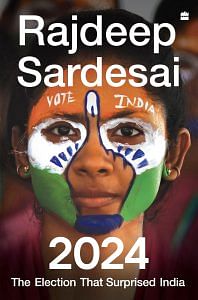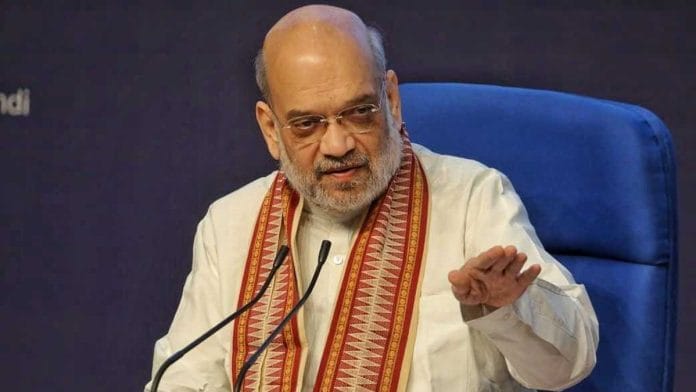The home ministry is a labyrinth of dark corridors and interconnected rooms in the imposing North Block on Raisina Hill. Bureaucrats and their attendants can be seen scurrying around with files marked ‘Top Secret’ and whispering to each other in hushed tones, unlike the disorderly cacophony across most government offices. Climbing up the main staircase, a large portrait of a sombre-looking Sardar Patel, independent India’s first home minister, comes into view. Patel’s formidable legacy has shaped the power and authority of the home minister’s office, and every successor has been dwarfed by his long shadow and towering achievements.
Shah’s predecessor, Rajnath Singh, was a relatively amiable figure, an ardent follower of the Atal Bihari Vajpayee school of consensual politics. A two-time national BJP president and chief minister of Uttar Pradesh in 2000 at the age of just forty-nine, Singh could claim to be ‘senior’ to his ministerial colleagues, including the Prime Minister. During Modi 1.0, he was the de jure No. 2, presiding over cabinet meetings in the absence of the Prime Minister. But Singh was acutely aware of his limitations as a mass leader and was reluctant to rock the boat. Shah was different, dramatically so. ‘When we walked into Rajnath ji’s chamber, we never felt intimidated. He was a senior politician but not someone who threw his weight around. Mr Shah, on the other hand, exudes power and lets you know that,’ recalled a retired home ministry bureaucrat.
Much of Shah’s sense of power is derived from his proximity to Prime Minister Modi. Theirs is a relationship that was nurtured in Ahmedabad’s highly competitive local politics in the 1980s, when Modi was the BJP’s Gujarat state secretary and Shah was a young party activist. Shah was Modi’s man Friday, his chief troubleshooter, his alter ego and, when needed, good cop to his bad cop and vice versa. Gujarat’s jodi No. 1 was a pair of contrasting personalities with one common ambition: power. At all costs.
And yet, Shah was much more than his senior leader’s factotum. Two anecdotes reveal the pugnacious style the younger partner in this long-standing equation has. The first came from an associate during Shah’s days as a student politician in the RSS’s Akhil Bharatiya Vidyarthi Parishad (ABVP) arm in Ahmedabad. In a college election, Shah was the ABVP candidate, pitted against a traditional rival, the Congress’s National Students’ Union of India (NSUI). The NSUI candidate for a key post was a woman, and the electoral college had a sizeable female student representation. ‘We feared that the girls would all vote for the NSUI candidate and ensure their victory, so we needed a plan B,’ recalled the associate. Shah, who was then joint secretary of the unit, hit upon an ingenious plan to get many of the girls to absent themselves on polling day. Phone numbers of the girls’ homes were obtained from the telephone directory. This, remember, was a pre-mobile universe. Frantic calls were made to their parents, warning them of likely trouble on the campus on voting day. Sure enough the number of women voters dwindled on D-day as many girls stayed away from college, and Shah managed to squeak home. It was his first election victory. ‘This is Amit bhai’s mind; it’s constantly coming up with new ideas,’ the storyteller concluded with a laugh. Devious. Manipulative. Or just clever and resourceful. Either way, Amit Shah clearly learnt his lessons in election management rather early.
The second story was told to us by Shah himself. He claimed to have questioned the Vajpayee government’s resolution to go ahead with the 1998 nuclear tests. Shah was then a first-time MLA, having just been elected to the Gujarat assembly in 1997. He had little access to the PMO, but that didn’t stop him from writing to the Prime Minister, critiquing the decision to go nuclear. ‘Now Pakistan will also test and we won’t be able to use our superior army to recapture Pakistan-occupied Kashmir,’ was the gist of Shah’s argument. Vajpayee was curious to know who this defiant young legislator was and even gave Shah an appointment to meet him. At the meeting, Shah repeated his charge against the government on the nuclear issue, convinced that he was right. ‘With Amit bhai, it is always nation and ideology first. He is a firm believer in the RSS’s Akhand Bharat concept, and he will defend his position on it whatever the consequences,’ claimed a party colleague.

This excerpt from Rajdeep Sardesai’s ‘2024: The Election That Surprised India’ has been published with permission from HarperCollins.







If Shah becomes PM, this country will face either a war on two fronts or an internal civil war. War mongerers are best out of power.
In preparation for coronation of Amit as PM next year the amazing media team of BJP started sharing this type of propaganda news to gain same kind of following as Modi.